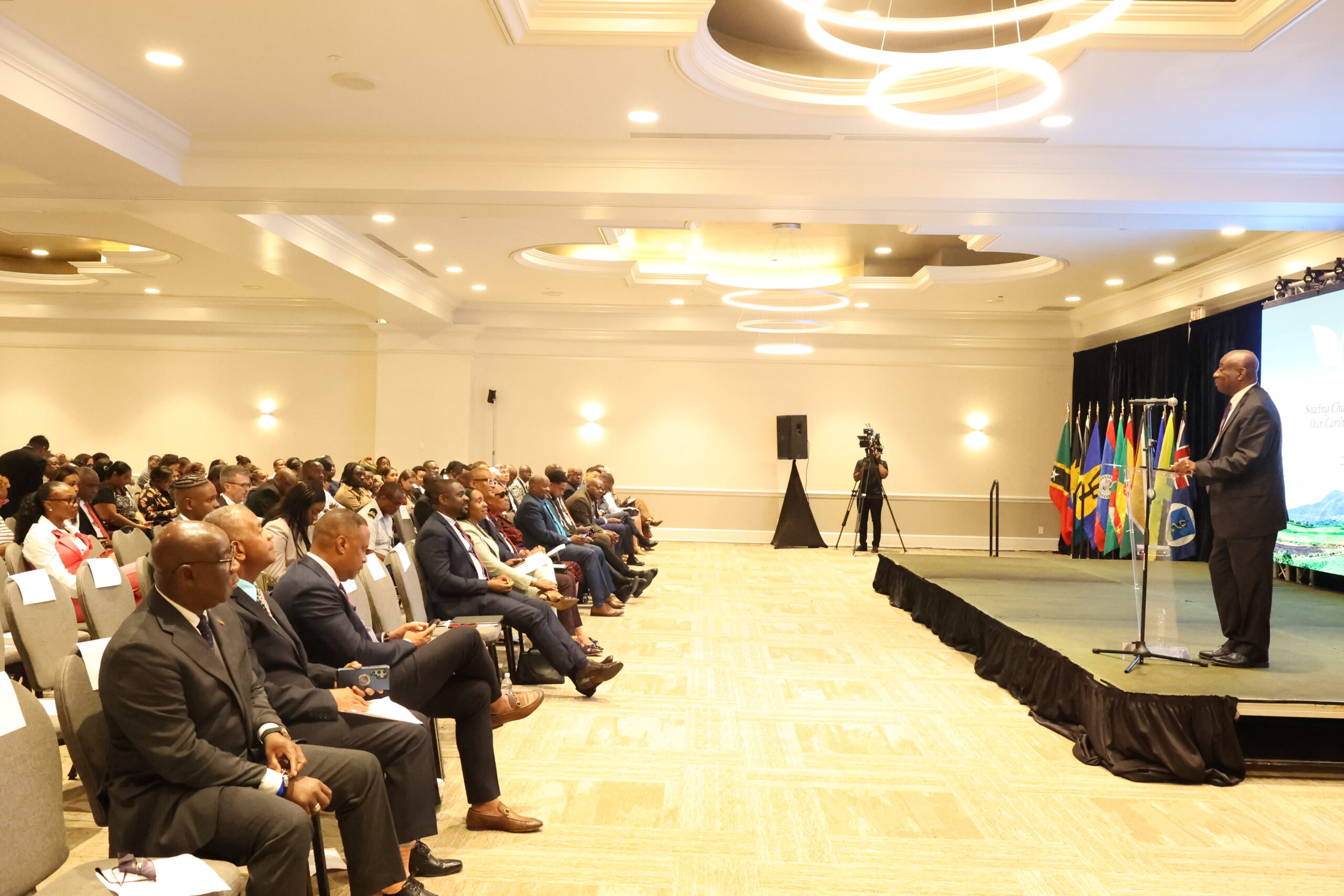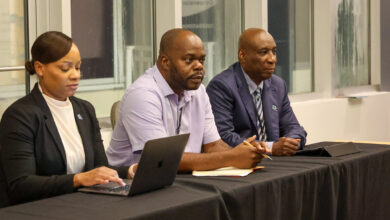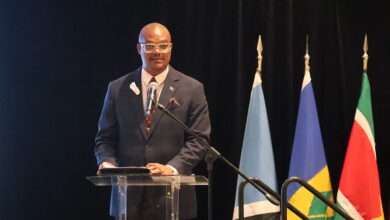“Just four short years ago, we started what was seen by many as just a dream when we launched our 25 by 2025 food import bill reduction programme. It was at the time a bold move to cut the Region’s food import bill by 25% by the year 2025. I am pleased to let you know that the programme has borne fruit and is continuing to provide us with green vegetables and fresh meat. We have seen real positive results.” – Dr. Wendell Samuel, Assistant Secretary-General, Economic Integration, Innovation and Development, CARICOM Secretariat
Dr. Wendell Samuel, Assistant Secretary-General (ag), Economic Integration, Innovation and Development at the CARICOM Secretariat, said the Region’s food security initiative has borne fruit, and called on all stakeholders to embrace Vision 25×25+5.
“Food and nutrition security is not optional; it is essential to our economic stability, social well-being, and environmental resilience of our Community. Let us therefore embrace 25 by 2025+5 as our collective commitment to sow the seeds of change and to harvest resilience for generations to come,” Dr. Samuel said at the opening of the 19th Caribbean Week of Agriculture in St. Kitts and Nevis on Monday, 29 September 2025, where more than 400 delegates are gathered for the five-day event.
Please read his remarks below:
On behalf of the Caribbean Community (CARICOM) Secretariat, it is my distinct pleasure to address you at the 19th Caribbean Week of Agriculture, the premier regional platform for advancing dialogue and action in agriculture and rural development.
I want to thank the government and the people of the Federation of St. Kitts and Nevis for hosting the CWA 2025. The kind hospitality for which St. Kitts is famous was on full display as we arrived yesterday. I want to express my gratitude to the planning team and all who have been involved in making the arrangements for the 19th CWA. Your exemplary leadership and attention to organisational detail are truly inspiring, for which the entire CARICOM Region is most appreciative.
Colleagues, your presence and participation in this year’s CWA signal to the Region, and the world, that food security is one of the highest priorities for the Region. It is an indication that the Region is doing something right. This success must be promoted, celebrated and shared with the Region and the whole world.
Just four short years ago, we started what was seen by many as just a dream when we launched our 25 by 2025 food import bill reduction programme. It was at the time a bold move to cut the Region’s food import bill by 25% by the year 2025. I am pleased to let you know that the programme has borne fruit and is continuing to provide us with green vegetables and fresh meat. We have seen real positive results.
Please allow me to share a few with you:
- The hosting of two highly successful Agriculture Investment Forums and Expos (Guyana and Trinidad and Tobago), which laid the groundwork for both public and private investments and governance mechanisms.
- Approval and implementation of critical regional policies:
- Trade Policy for Animal and Animal Products
- Regional Agricultural Health and Food Safety Policy
- SPS Guidelines and Alternate SPS Settlement Mechanism
- Regional Guidelines for 19 Agricultural Commodities
- Introduction of a regional agricultural insurance mechanisms.
- Mobilisation of cross-border agricultural investments.
- Creation of a US$100M Regional Agriculture Loan Fund.
- Expansion of storage facilities for soy/corn up to 27,000 tonnes.
- Increased resource mobilisation and coordination toward implementation of the initiative.
- Large-scale private sector investments in dairy, small ruminants, soy, and poultry. This includes the construction of a US$20M milk and dairy facility in Guyana. Such investments are critical to fostering the innovations which would help attract the you people to the industry, for whom the Regional Youth in Agriculture Strategy was developed. I have had the opportunity to take field trips to two of the projects. The technology an innovation involved are game-changing. The kind of initiatives that would help to utilise our limited land and labour resources more productively and usher in a more competitive sector.
Other positive initiatives include:
- Establishment of a Regional Electronic Agriculture Market Information System.
- Expanded technical assistance programmes between Member States which is key to knowledge-sharing across the Region.
- Improved alignment of development partners with regional food and nutrition security priorities.
- Investment in greenhouse technology and cold storage across the Region.
The list goes on and on, but we only have limited time today. Moreover, we ought not to rest on our laurels. There is much more interesting work ahead of us than what’s behind us.
As we assess progress, it is clear that this initiative has been transformative — galvanising investment, policy reform, and innovation across Member States.
However, we know the journey does not end here. We now extend this effort through 25 by 2025+5; not as an admission of delay, but as a declaration of resolve. It signals that our Community is serious about consolidating gains, scaling up successful approaches, and achieving long-term resilience by 2030.
25 by 2025+5 is therefore more than a target. It is a strategic framework for action focusing on key outcomes such as:
- Scaling up priority commodities such as poultry, small ruminants, root crops, fruits, and vegetables.
- Embracing climate-smart agriculture to counter the risks of drought, flooding, and hurricanes.
- Harnessing digital technology and innovation to improve productivity, traceability, and access to markets.
- Ensuring inclusion by empowering our youth, supporting women entrepreneurs, and strengthening the role of farmers and fishers who are the backbone of our food systems.
Achieving these ambitions requires strong partnerships. Governments, the private sector, financial institutions, and development partners must work together to mobilise investment, transfer knowledge, and create the enabling environment for agribusiness to thrive.
The Caribbean Week of Agriculture provides precisely this platform: to share best practices, forge new collaborations, and showcase the ingenuity of our farmers, processors, innovators and stakeholders.
We must use this CWA to forge strong investments, technical alliances, project formulations, and promote social entrepreneurship and impact for the Region’s food system.
In this regard, I would like to recognise the significant contribution of the Director General of IICA, Dr. Manuel Otero, to the CWA and the agriculture sector in general. You have been one of our staunchest supporters over the two terms. I wish you the best in the next chapter of your life beginning on 15 January 2026.
Colleagues, we all agree that the task before us is urgent. Food and nutrition security is not optional; it is essential to the economic stability, social well-being, and environmental resilience of our Community.
Let us therefore embrace 25 by 2025+5 as our collective commitment to sow the seeds of change and to harvest resilience for generations to come.
In closing, I thank the Government and people of St. Kitts and Nevis for hosting this important gathering, and I wish you all fruitful deliberations and a successful Caribbean Week of Agriculture.






